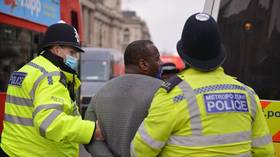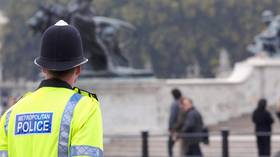Report exposes ‘dehumanization’ of police in Europe

Police forces in both Britain and continental Europe have developed a “culture of extremism” which is now deepening, the UK-based Institute of Race Relations (IRR) think tank has claimed in a new report. According to the study, “dehumanization” and a “sense of superiority” are factors further aggravating the situation.
In research titled “Racism, Radicalisation and Europe’s ‘Thin Blue Line’,” which was published in the July issue of Race & Class journal, IRR head Liz Fekete argues that racism “has become entrenched in policing.”
Officers’ “sense of impunity” combined with the assumed “special role and status in the society” leads, in some instances, to “collusion and collaboration with militarized far-right groups,” she stated.
“Strikingly, in several countries, such as France, Belgium, Germany and Hungary, extreme-right mayoral and parliamentary candidates have been former high-ranking officers,” she claimed.
According to the report, while instances of abuse of power by police are on the rise, attempts to call the officers to account face “a particularly aggressive response,” especially in those countries “where support for the police and the military is seen as a patriotic duty,” such as France.
Fekete drew a parallel with the US, where the anti-racism Black Lives Matter movement, sparked by the murder of George Floyd by a police officer, was met by a Blue Lives Matter countermovement, which insisted that attacks on law enforcement should be treated as a hate crime. In her research, Fekete notes that there’s a similar trend of “recasting… the police as victims” in Europe.
She argues that even in the Netherlands, which is known for “a liberal, community oriented model” of policing, the law enforcement unions “are responding aggressively to criticism, particularly attempts to rein in racial profiling through the introduction of monitoring measures.”
“We are witnessing an ideological backlash from politicians, police leaders, police trade unions and related bodies which are aggressively intervening in the public space to defend the use of lethal weaponry, dangerous restraint techniques and racial profiling on the streets,” she claimed.
The “systematic biases” – racism, a “dehumanizing mindset,” and “overall sense of impunity and entitlement” – reveal themselves particularly vividly in police officers’ private WhatsApp groups and Facebook message boards, which, as Fekete states, “make for uncomfortable reading.”
“Today’s crisis in policing is symptomatic of the wider crisis of democracy,” she said, commenting on the investigation.
The report follows a number of UK scandals over police behavior. In February, the Independent Office for Police Conduct (IOPC) told Scotland Yard to take immediate steps to eradicate racism, to tackle bullying, and to train officers on the “appropriate use of social media.” The IOPC’s 15-page report exposed “racism, misogyny, harassment and the exchange of offensive social media messages” within the Metropolitan Police ranks.













